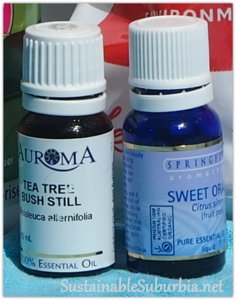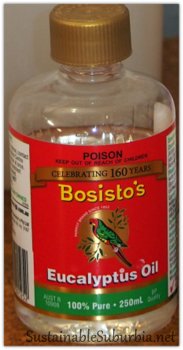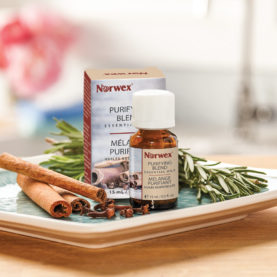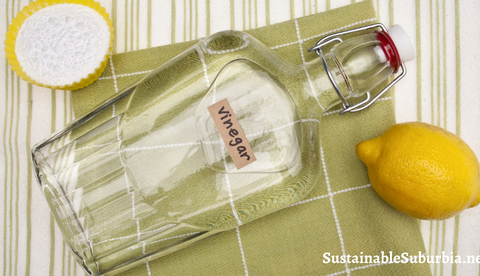Last updated on July 26th, 2021 at 07:10 pm

Do you know which essential oils are best for cleaning? Or what about for disinfecting?
On this page:
Citrus Oils | Eucalyptus Oil | Tea Tree Oil | Clove Oil | Cinnamon Oil | Rosemary Oil | Peppermint Oil | Safety & Cautions | Which Brand?
I used to work as a massage therapist, and in fact taught in an accredited massage therapy course years ago, before I had children. Ever since that time I have always had a selection of essential oils in the house, not just for cleaning, but for home treatment of various ailments. I even still use them in the occasional massage!
Essential oils can enhance your cleaning products by helping them clean, by acting as disinfectants, and of course by creating that lovely “clean” smell many of us are used to. Of course, essential oils are also very concentrated and some are safer than others. There are some oils that should not be used during pregnancy or around young children, or only with great care.
Here’s the low down on seven essential oils to use for good effect. (See notes at the bottom of the list regarding safety.)
Lime, orange & the other citrus oils
The method of soaking citrus peel in vinegar to increase vinegar’s cleaning properties works because of the d-limonene in citrus peel, which is an excellent grease cutter. Citrus essential oils likewise contain this cleaning agent. Grapefruit and orange generally have the highest levels of d-limonene, but all citrus fruit have some (source). They are also effective anti-bacterials, in the this study, for instance lime oil was one of the most effective antimicrobial of the 21 oils studied, though lemon and orange were not far behind.
I typically use lime oil in my disinfectant cleaning wipes and sometimes add it to my DIY spray ‘n’ wipe. I also use it in my “Faux Four thieves” blend that I tend to spray around when there are nasty bugs in the house, as a general anti-microbial. (This is the same as the EO based vinegar disinfectant spray on my non-toxic cleaning printables, only Faux Four Thieves is a much better name, don’t you think?)
 Eucalyptus oil
Eucalyptus oil
Who doesn’t love the smell of Eucalyptus oil? Okay, maybe not everyone does, but I do. I use it in my wool wash and in fact in my ordinary laundry liquid too. It’s the main reason I like to make the liquid, even though the powder is effective for longer. I just love the smell 🙂 Eucalyptus oil is also reputed to have disinfectant properties, and to kill dust mites.
Pure eucalyptus oil (ie not the essential oil, though it would probably work too, but at greater cost) makes a good laundry spot stain remover for unknown stains. Pour a few drops onto the stained area and leave for a minute or two. You can also use it to get sticky substances like chewing gum and glue out of clothes, and sticky labels off bottles.
Edited to add: I no longer make my own laundry detergent but when I use the dryer, I often put some eucalyptus oil on a wool dryer ball, especially if I am drying towels. Smells so good! 🙂
Tea tree oil
Tea tree oil is generally considered to be a good anti-bacterial, anti-viral and anti-fungal. I always keep a bottle around as a general antiseptic, and to as a mosquito repellent. I also use it in my disinfectant cleaning wipes, and it could certainly be used in a four thieves blend. Tea tree oils is also said to be good against mould, but I generally prefer to use clove leaf oil if I have it.
Tea tree oil has been studied relatively extensively, and in particular has been found to be similarly effective against antibiotic resistant strains of bacteria to other strains. Whether bacteria can also become resistant to tea tree oil is unclear, but the balance of the evidence suggests maybe not – though not all the evidence is in agreement here. (source)
Clove oil
Clove leaf oil (also called oil of cloves) is very effective against mould. Clove bud oil, which is more often found in aromatherapy, is less effective against mould, because it has a lower eugenol content (though presumably it has other benefits when used therapeutically). Clove oil was also found to have the second most effective antimicrobial activity in the same study mentioned above, after cinnamon oil, though it’s not clear whether they used leaf or bud oil.
I use clove oil in my faux four thieves spray (with a vinegar base), which I use to clean mould, or a little in the washing machine if I have mouldy smelling (but not stained) clothes. But, I find the smell overpowering, so I tend to use it quite sparingly.
BUT: Avoid clove oil if you have any respiratory issues, and always use it in a well ventilated space, regardless.
 Cinnamon oil
Cinnamon oil
Cinnamon oil gets a mention because it came out as number one in antimicrobial activity, both in the study mentioned above, and in this study, which looked at the efficacy of oils in vapour, rather than liquid form.
Again, it has quite an overpowering smell (though I personally like it better than the smell of clove oil), so I use it sparingly. It does make it into my four thieves blend though.
Wild Thyme oil also showed to good effect in that second study, but I really don’t like the smell of it, so I mostly use it only in my faux four thieves spray.
Rosemary oil
Rosemary also has antimicrobial properties, and as a bonus is often a good remedy for headaches, plus it has that invigorating scent that you probably need if you’re busy cleaning right?
I mostly keep rosemary around for when I have a cold and I add it to my shower disks, but you can also use it in your cleaning products for a lovely refreshing scent. Try cleaning your kitchen floor with a bucket of water to which you’ve added ¼ vinegar and 5-10 drops of rosemary oil.
If you use a Norwex mop you will not need a bucket of water of course, nor any vinegar or other cleaning chemicals, just a wet mop pad – but you can add some rosemary oil to a spray bottle of water and spray the floor here and there as you mop, if you are after a “fresh scent” to invigorate you. 🙂
Peppermint Oil
Mmm, Peppermint. I love it! Peppermint oil had similar microbial efficacy to lemon and orange oil in the first study mentioned above. It also did reasonably well in the second study, though it didn’t have a patch on cinnamon, lemongrass or thyme.
I always keep peppermint oil around for my cold & flu remedies, but it can be also used in cleaning. It’s also said to be a pest repellent, particularly for mice.
Safety & Cautions:
Always keep your essential oils out of the reach of children. Ingesting a couple of teaspoons of some oils could be fatal.
Generally, don’t use any oils on young children’s skin, and especially keep the eucalyptus and peppermint away from their faces, as they can cause some children to have difficulty breathing.
Essential oils should also be used with caution by pregnant women: most oils are okay to use in a vapouriser, but not necessarily on your skin, so use gloves when cleaning with essential oils. In particularly, rosemary and peppermint should generally be avoided in pregnancy.
Clove oil is also problematic if you have any respiratory issues and I would keep it away from young children.
For more information on essential oil safety, the booklet Using Essential Oils Safely by Lea Harris is a good resource. It’s available here (edited to add: this book is no longer free, but there is a wealth of information on her blog).
Which brand of essential oil should you use?
Okay, let’s dispel a few myths.
- While price is relevant, an oil that costs a whole lot more, is by no means necessarily a better oil. On the other hand, I personally tend to avoid brands that are significantly cheaper than the ones I find in my health food store.
- Any oil brand that tells you it’s certified therapeutic is certified by itself. In other words, that is just marketing mumbo jumbo. Oils can be certified organic (look for a certifying body), and in Australia they can be listed with the Therapeutic Goods Association, which means they must be manufactured by someone holding a certification of Good Manufacturing Practice, but not that they have been tested by the TGA. Some essential oils may need to be registered with the TGA which involves more checks than listing, but, most are simply listed. However, registration costs a packet, and smaller companies generally won’t have it. That doesn’t necessarily mean they are shonky (it does mean they can’t legally make therapeutic claims for their oils – they can still sell them though).
- All essential oils are pure oils, so telling you it’s pure is again, just marketing hype. After all, they’re hardly going to admit it’s not pure are they? That would be the same as saying it wasn’t actually an essential oil.
- For aromatherapy purposes you want a quality oil, and it makes a difference where the plant was grown. So if the brand of oil you are looking at doesn’t tell you where the oil came from (eg Tasmanian Lavender vs Bulgarian), it mostly likely means it is just an amalgam, which means the outcomes are less predictable. This is certainly a quality signal, but on the other hand, if you are not a qualified aromatherapist, you won’t know whether you want Tasmanian or Bulgarian anyway.
- Another quality signal is that they list the scientific name of the plant (since there are sometimes more than one plant with the same common name, eg Thyme oil), and where applicable the chemotype, but only some oils have multiple chemotypes (indicted by the letters ct. before a latin word I won’t know the meaning of).
- If you want to, you should be able to get GC/MS test results from your company of choice, for any given oil. There are a limited number of oil distiller in the world, and most companies get their oil through them. But, if they care about quality, they will be testing them before they package them for you. (I don’t expect you to know how to read the test results, but if you can get them, that’s a good sign).
- For cleaning purposes, I simply don’t worry too much. Because I’m in Australia I generally buy a TGA listed brand, and leave it at that. If you really are just wanting that “fresh” smell as you clean, you can worry even less. DO make sure you are not buying “fragrance oils” which are synthetic and can contain any number of nasty chemicals include phthalates (a hormone disrupter).
- You might find this mini study interesting,* especially if you are in the US, in which several brands of tea tree oil were tested by an independent lab (they’ve also tested myrrh and are preparing to test peppermint oil). Most were found to be “compliant” with the norm for tea tree oil, including some brands that are relatively inexpensive.
- There’s an obvious benefit to buying certified organic essential oils if they are available, especially if you are going to use them on your skin (and for the environmental impact, regardless of how you use them).
- A note on blends – sometimes you can save money by buying pre-blended essential oils, especially if they contain some of the more expensive choices. Essential oils do have a limited shelf life, so spending a lot of money on several different bottles that you may not use up completely before their best before date, may not be the most cost effective option. On the other hand, if you store them in a cool, dark place, they will still have a fair degree of efficacy for a good while after their best before date.
*2017 Note: The website with the tea tree oil testing that I linked to is no longer available, so I have linked to it on the WayBack Machine instead (an internet archiving service). The aromatherapist who ran it, Lea Harris, still has a website but with a new URL and she no longer has the test results listed. It’s on my list of things to do to contact her and ask why, but for the moment, I’m just leaving the way back machine link up for your interest.
Now over to you: Did you guess what my seven oils would be? Do you use essential oils at home? Do you have a favourite oil, or a favourite way to use them?
But wait, I have more questions: if you don’t already use essential oils, why not, and will you try some now? If you do use essential oils do you go by what smells good to you, or by the actual cleaning and disinfectant qualities?
(Tip: There is no “right” answer to this question – I go by both!)

 Eucalyptus oil
Eucalyptus oil


What a helpful article. I am printing this out right now and putting it with my shopping list for next week. Thank you!
Thanks for commenting Joanne, I’m so glad you found it useful!
What a helpful article. I am printing this out right now and putting it with my shopping list for next week. Thank you!
Thanks for commenting Joanne, I’m so glad you found it useful!
We use Eucalyptus and tea tree oil in our house, I love them both, but have never ventured to other oils. Will have to try some! thanks for sharing. -Aroha (for #teamIBOT)
I think Eucalyptus and tea tree were where I started to Aroha. They are very useful oils!
We use Eucalyptus and tea tree oil in our house, I love them both, but have never ventured to other oils. Will have to try some! thanks for sharing. -Aroha (for #teamIBOT)
I think Eucalyptus and tea tree were where I started to Aroha. They are very useful oils!
A great rundown! I am a qualified Aromatherapist too. I like to use tea tree for skin conditions at our place. I always have lemon and lavender on hand too.
Hi Jody, thanks for commenting. I hope I didn’t give the impression that I’m a qualified aromatherapist. There was some aromatherapy included in our course, and I did an extra unit in it, but I’m by no means fully qualified! It is an area that fascinates me though, I must admit 🙂
A great rundown! I am a qualified Aromatherapist too. I like to use tea tree for skin conditions at our place. I always have lemon and lavender on hand too.
Hi Jody, thanks for commenting. I hope I didn’t give the impression that I’m a qualified aromatherapist. There was some aromatherapy included in our course, and I did an extra unit in it, but I’m by no means fully qualified! It is an area that fascinates me though, I must admit 🙂
I love using essential oils for cleaning. Chemicals especially spray once upset my asthma so it is natural here. It took a while for my husband to get it esspecially give up his nasty Glen 20 addiction but I have now convinced that you can be just as clean just using vinegar and essential oils.
That’s great Eleise! It can take a bit of convincing for those around us can’t it? But I figure if soap and water is good enough for the hospitals these days… I love adding essential oils to my vinegar to make it more effective (as a cleaner or a disinfectant, and also just the smell 🙂 )
I love using essential oils for cleaning. Chemicals especially spray once upset my asthma so it is natural here. It took a while for my husband to get it esspecially give up his nasty Glen 20 addiction but I have now convinced that you can be just as clean just using vinegar and essential oils.
That’s great Eleise! It can take a bit of convincing for those around us can’t it? But I figure if soap and water is good enough for the hospitals these days… I love adding essential oils to my vinegar to make it more effective (as a cleaner or a disinfectant, and also just the smell 🙂 )
Interesting info! I’ve just increased my aromatherapy collection and I’m using it for everything from cleaning to fly spray. Just fantastic and smells great.
I even made an anti-nausea perfume for my partner so he smells great and keeps travel sickness at bay. He loves it!
Wow, that’s great Zoe. I wish I could have found an anti-nausea blend that worked for me in pregnancy, but sadly, nothing seemed to make any difference, except sucking on a lemon (which only worked as long as I did it!).
Interesting info! I’ve just increased my aromatherapy collection and I’m using it for everything from cleaning to fly spray. Just fantastic and smells great.
I even made an anti-nausea perfume for my partner so he smells great and keeps travel sickness at bay. He loves it!
Wow, that’s great Zoe. I wish I could have found an anti-nausea blend that worked for me in pregnancy, but sadly, nothing seemed to make any difference, except sucking on a lemon (which only worked as long as I did it!).
Lime, Lemongrass & Tea Tree are my fav’s for cleaning and de-bugging around the home. Just love the freshness that bring. 🙂
Yeah, that fresh smell! – I love just a Lime & tea tree mix too. Thanks for commenting Nikki.
Lime, Lemongrass & Tea Tree are my fav’s for cleaning and de-bugging around the home. Just love the freshness that bring. 🙂
Yeah, that fresh smell! – I love just a Lime & tea tree mix too. Thanks for commenting Nikki.
Wow, thank you for this! I try to use oils and vinegar to clean home. I recently tried soaking citrus peel in vinegar, and it was great! x
You’re welcome Zanni! I hope you find some more options in here, although really citrus infused vinegar is so multipurpose! It covers a lot of ground in our house. 🙂
Wow, thank you for this! I try to use oils and vinegar to clean home. I recently tried soaking citrus peel in vinegar, and it was great! x
You’re welcome Zanni! I hope you find some more options in here, although really citrus infused vinegar is so multipurpose! It covers a lot of ground in our house. 🙂
Oooo thanks for dispelling those myths, I’ve often wondered about a few of those points!!! I’m not so great at using oils for cleaning, but my sister does so maybe I should cotton on quick smart!
You’re welcome Emily. And there’s no real should about it (I don’t think) but they definitely do have their benefits. 🙂
Oooo thanks for dispelling those myths, I’ve often wondered about a few of those points!!! I’m not so great at using oils for cleaning, but my sister does so maybe I should cotton on quick smart!
You’re welcome Emily. And there’s no real should about it (I don’t think) but they definitely do have their benefits. 🙂
I’ve started soaking lemon peel in vinegar – I’ll then add sweet orange / lavender / grapefruit / rosemary EO in any combination of what I fancy that day. I have a separate spray bottle where I don’t add any EO & that’s for glass cleaning, but otherwise this is all I use 🙂
Sounds like a lovely combination Nicole! 🙂
I’ve started soaking lemon peel in vinegar – I’ll then add sweet orange / lavender / grapefruit / rosemary EO in any combination of what I fancy that day. I have a separate spray bottle where I don’t add any EO & that’s for glass cleaning, but otherwise this is all I use 🙂
Sounds like a lovely combination Nicole! 🙂
I always include some tea tree oil in the cuticle oil I make up, just in case there is a chance of an inflamed cuticle. I rarely do have any problem with my cuticles but I figure what the heck. I just use a few drops of it in the mixture – the scent is very overpowering and I don’t like scent very much other than the perfume I use. ?
I enjoy your articles – puts a different spin on the various products and such that we use in the course of having fabulously polished nails!
I always include some tea tree oil in the cuticle oil I make up, just in case there is a chance of an inflamed cuticle. I rarely do have any problem with my cuticles but I figure what the heck. I just use a few drops of it in the mixture – the scent is very overpowering and I don’t like scent very much other than the perfume I use. ?
I enjoy your articles – puts a different spin on the various products and such that we use in the course of having fabulously polished nails!